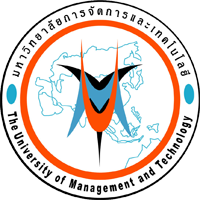The Priority Needs of School Academic Management Based on The Concept of Student Competencies in Response to The Needs of Eastern Economic Corridor
Keywords:
Academic Management, Student Competencies, Eastern Economic CorridorAbstract
This research was conducted by using the multiphase mixed method research which includes both quantitative research and qualitative research. The objective of this research was to analyze the the priority needs of school academic management based on the concept of student competencies in response to the needs of eastern economic corridor. The sample groups were the school expanded educational opportunities in the Eastern Economic Corridor chosen by using Yamane sample size formula (1973: 398) at 95% Confidence Interval with tolerance (e) ± 5%. The research instrument used in this study was the 5-level rating scale questionnaire. The data was analyzed by frequency distribution, percentage, mean, standard deviation, and Modified Priority Needs Index (PNImodified). The results of the priority needs ranking were as follows: the highest of priority need was the curriculum development. Next was measurement and evaluation. The lowest of priority need was media development learning resources educational innovation and technology. When considering the learner competencies, it was found that the highest of priority was innovative thinking competencies. Next was entrepreneurial competencies. The lowest of priority need was performance in complex environments.
Downloads
References
พันธวิชญ์ เลี้ยงชีพชอบ. (2561). กลยุทธ์การบริหารวิชาการของโรงเรียนประถมศึกษาตามแนวคิดคนไทย 4.0. (วิทยานิพนธ์ปริญญาครุศาสตรดุษฎีบัณฑิต) คณะครุศาสตร์ จุฬาลงกรณ์มหาวิทยาลัย.
พิสิฐ รังสฤษฎ์วุฒิกุล. (2561) พัฒนากำลังคนโลจิสติกส์ ยกระดับสมรรถนะตอบรับงาน EEC [ออนไลน์] แหล่งที่มา:
https://www.khaosod.co.th/uncategorized/news_1337619.
พัชรี จันทร์เพ็ง. (2545). เอกสารประกอบการสอนวิชาการวัดและประเมินผลการศึกษา.
สำนักงานคณะกรรมการนโยบายเขตพัฒนาพิเศษภาคตะวันออก. (2561). โครงการเขตพัฒนาพิเศษภาคตะวันออก (อีอีซี) เป็นแผนยุทธศาสตร์ภายใต้ ไทยแลนด์ 4.0 [ออนไลน์] แหล่งที่มา: https://www.eeco.or.th.
สำนักงานบริหารนโยบายของนายกรัฐมนตรี. (2561). โครงการพัฒนาระเบียงเศรษฐกิจภาคตะวันออก (Eastern Economic Corridor: EEC) [ออนไลน์] แหล่งที่มา: https://pmdu.soc.go.th/eec-2/3986.
สำนักงานเลขาธิการสภาการศึกษา. (2560). แผนการศึกษาแห่งชาติ พ.ศ. 2560-2579. กรุงเทพฯ: พริกหวานกราฟฟิค จำกัด.
สำนักงานเลขาธิการสภาการศึกษา กระทรวงศึกษาธิการ. (2562). แนวทางการพัฒนาสมรรถนะผู้เรียน ระดับการศึกษาขั้นพื้นฐาน กรุงเทพฯ: บริษัท 21เซ็นจูรี่ จำกัด.
สันติ บุญภิรมย์. (2552). การบริหารงานวิชาการ. กรุงเทพฯ: บุ๊คพอยท์.
สุกัญญา รัศมีธรรมโชติ. (2555). การจัดการทรัพยากรมนุษย์ด้วย Competency based HRM. (พิมพ์ครั้งที่ 1 ed). กรุงเทพฯ:สถาบันเพิ่มผลผลิตแห่งชาติ.
สุวิทย์ มูลคำ และอรทัย มูลคํา. (2546). 19 วิธีจัดการเรียนรู้ : เพื่อพัฒนาความรู้และทักษะ. กรุงเทพฯ : ภาพพิมพ์.
อาจารี สุวัฒนพงษ์. (2558). กลยุทธ์การบริหารวิชาการเพื่อเสริมสร้างทักษะการคิดเชิงวิพากษ์ของนักเรียน โรงเรียนมัธยมศึกษา. (วิทยานิพนธ์ปริญญาครุศาสตรดุษฎีบัณฑิต) คณะครุศาสตร์ จุฬาลงกรณ์มหาวิทยาลัย.
Downloads
Published
Issue
Section
License
ประกาศลิขสิทธิ์
เนื้อหาและข้อมูลในบทความที่ลงตีพิมพ์ในวารสารวิชาการมหาวิทยาลัยการจัดการและเทคโนโลยีอีสเทิร์น ถือเป็นข้อคิดเห็นและความรับผิดชอบของผู้เขียนบทความโดยตรง ซึ่งกองบรรณาธิการวารสารไม่จำเป็นต้องเห็นด้วยหรือร่วมรับผิดชอบใด ๆ
บทความ ข้อมูล เนื้อหาหรือรูปภาพ ฯลฯ ที่ได้รับการตีพิมพ์ในวารสารวิชาการมหาวิทยาลัยการจัดการและเทคโนโลยีอีสเทิร์น ถือเป็นลิขสิทธิ์ของวารสารวิชาการมหาวิทยาลัยการจัดการและเทคโนโลยีอีสเทิร์น หากบุคคลหรือหน่วยงานใดต้องการนำข้อมูลทั้งหมดหรือบางส่วนไปเผยแพร่ต่อหรือเพื่อกระทำการใด ๆ จะต้องได้รับอนุญาตเป็นลายลักษณ์อักษรจากวารสารวิชาการมหาวิทยาลัยการจัดการและเทคโนโลยีอีสเทิร์นก่อนเท่านั้น




